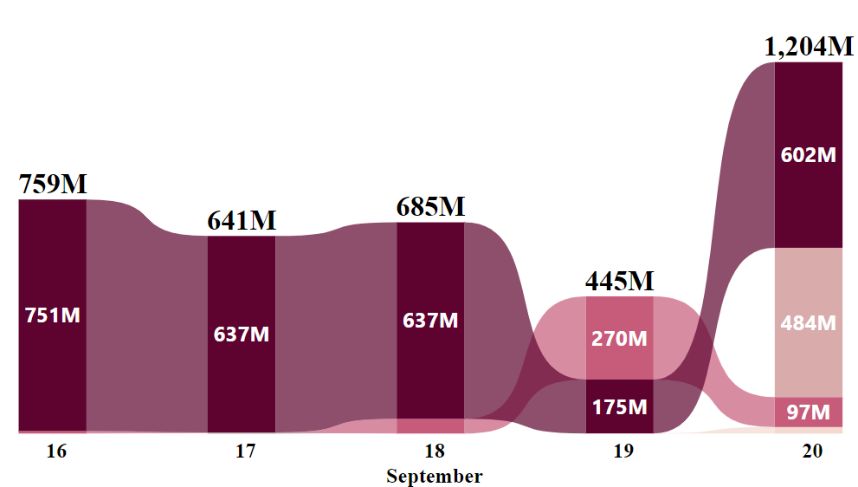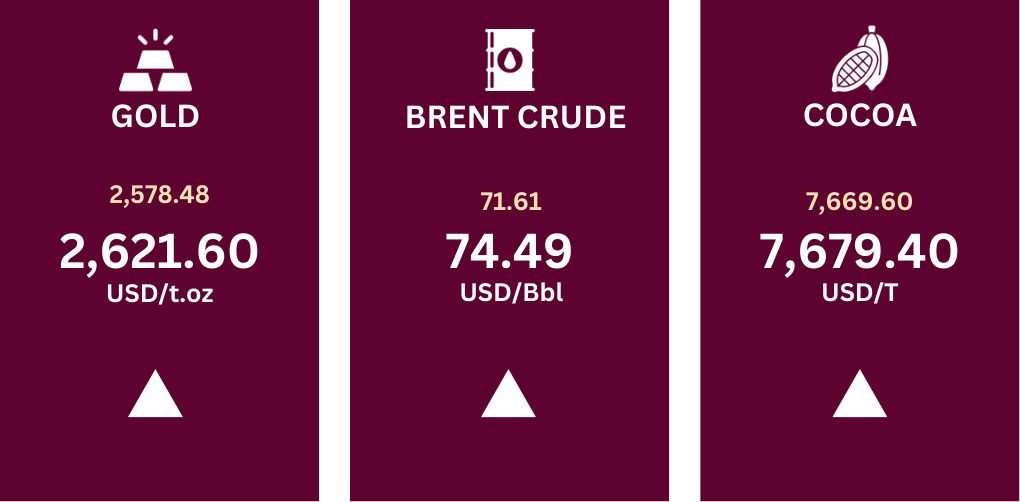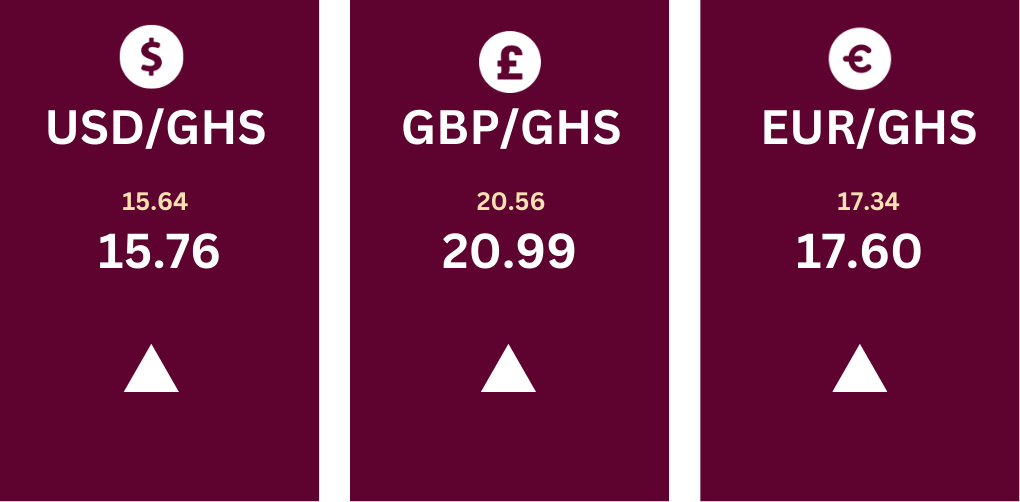WEEKLY FINANCIAL MARKET REPORT AS OF 20TH SEPTEMBER 2024
KEY HEADLINES
Ghana’s annual GDP growth in Q2 2024 reached 6.9%, its highest level in five years. (Ghana Statistical Service, 2024)
Producer price inflation in Ghana accelerated for the sixth straight month to 33.2% in August 2024, up from 29.1% in the prior month. (Ghana Statistical Service, 2024)
The Cocoa Marketing Company (CMC), Ghana Shippers’ Authority (GSA), and 17 shipping lines involved in Ghana’s cocoa trade have successfully concluded negotiations, agreeing to an average 5% increase in the basic freight rate for the 2024/2025 cocoa season. (Ghana Shippers Authority, 2024)
GDP GROWTH RATE YEAR-ON-YEAR
After an upwardly revised 4.8% increase in the prior three months, Ghana’s annual economic growth in Q2 2024 reached 6.9%, its highest level in five years. The services sector, which accounts for the lion’s share of economic growth, expanded by 5.8% while the industrial and agricultural sector all had increases in output.
The industrial sector had a 9.3% expansion, with mining and quarrying being the main drivers. The gold industry grew by 23.6% for the third quarter in a row. Agricultural output increased by 5.4%, even though the cocoa subsector shrank by 26.2% for the fourth consecutive quarter. Seasonally adjusted quarterly GDP growth in Q2 was 1.6%, up from 1.2% in Q1
PRIMARY DEBT MARKET ISSUANCE WEEK
The GoG Treasury Bill interest rates had a general upturn in all securities compared to the previous week. This week’s total bids received amounted to GH₵ 3,778.07 million for the 91-day bill, GH₵ 441.43 million for the 182-day bill, and GH₵ 175.04 million for the 364-day bill, with all bids fully accepted.
The range of bid interest rates for the 91-day bill was between 24.8088% and 25.4357%, with a weighted average interest rate of 25.0104%. For the 182-day bill, bid interest rates ranged from 26.7959% to 26.8249%, with a weighted average interest rate of 26.8151%. The 364-day bill had a bid interest rate between 28.0410% and 28.1499%, with a weighted average interest rate of 28.0789%.
| Security | Current Wk % |
Previous Wk % |
|
91-Day GoG Bill |
25.4357 |
24.9165 |
|
182-Day GoG Bill |
26.8151 |
26.8012 |
|
364-Day GoG Bill |
28.0789 |
28.0736 |
GHANA FIXED INCOME MARKET VOLUME TRADED
Overall, the Ghana Fixed Income Market (GFIM) had a decline of 10.55% from the previous week, with a total traded volume of GH₵ 3.73 billion at the end of the week. This week posted 12,710 total number of trades, a 5.19% dip in activity compared to last week. With a market share of 98.86%, Treasury bills outpaced New GoG Notes & Bonds’ 0.88%.
Between September 16 and September 20, 2024, trading volumes varied among securities, with September 16 witnessing GH₵ 759 million in trades, mostly driven by Treasury bills. On September 17, trade volume reduced to GH₵ 641 million, again driven by heightened activity in Treasury notes. The upswing regained marginally on September 18, with volumes climbing to GH₵ 685 billion, mostly owing to Treasury bill trading.


Week’s Ghana Fixed Income Market Total Volume Traded
However, the market experienced a steep dip on September 19, with volumes decreasing to GH₵ 455 million, headed by New GoG Bonds & Notes. By September 20, the market finished with GH₵ 1,204 million in trading, including noteworthy contributions from Treasury bills, Sell/Buy Back trades, and New GoG Notes & Bonds.
EQUITY MARKET
Trading activity on the local bourse surged this week, with a volume of 6,036,528 shares exchanged, marking an 89.69% increase from the previous week. The total traded value also saw a significant rise of 102.54%, reaching GH₵ 14.38 million. Despite this heightened trading activity, market capitalization recorded a modest gain of 0.32%, closing at GH₵ 92.7 billion.

Week’s Equities Top Gainers
In terms of market indices, the GSE Composite Index (GSE-CI) closed at 4,381.86, showing a weekly gain of 0.20% and a monthly gain of 0.65%, but maintaining a strong year-to-date gain of 39.99%. Meanwhile, the GSE Financial Stocks Index (GSE-FSI) also increased to reach 2,153.83 points, posting a slight weekly increase of 0.77%, a monthly rise of 1.69%, and a year-to-date gain of 13.27%.
|
EQUITY MARKET MOST TRADED STOCKS |
||
|
Ticker |
Traded Volume |
Price (GHS) |
|
MTNGH |
5,661,286 |
2.20 |
|
GCB |
187,253 |
6.00 |
|
SIC |
69,158 |
0.25 |
|
CAL |
53,459 |
0.31 |
|
FML |
29,995 |
3.50 |
Source(s): Ghana Stock Exchange
In the equity market, MTNGH was the most traded stock with a volume of 5,661,286 shares at a price of GHS 2.20. GCB followed with 187,253 shares traded at GHS 6.00. SIC traded 69,158 shares at GHS 0.25, while CAL saw 53,459 shares traded at GHS 0.31. Lastly, FML traded 29,995 shares at a price of GHS 3.50.
|
TOP PERFORMING AFRICAN STOCK INDICES YEAR-TO-DATE |
|||
|
Country |
Index |
Level |
YTD % |
|
Zambia |
LuSE ASI |
15,978.01 |
▲47.56 |
|
Ghana |
GSE-CI |
4,381.86 |
▲39.99 |
|
Nigeria |
NGSE ASI |
98,386.60 |
▲31.58 |
|
Malawi |
MSE ASI |
143,431.32 |
▲29.27 |
|
Egypt |
EGX 30 |
31,002.54 |
▲24.62 |
COMMODITY MARKET
The commodities market experienced a broad decline in performance compared to the previous week. From September 16th to 20th, 2024, the price of gold underwent oscillations as it responded to a mix of global economic data and geopolitical tensions. Gold prices marginally climbed from US$ 2,578.48 to US$ 2,621.60 per troy ounce. Wednesday, the Federal Reserve announced its first interest rate cut in four years, dropping the

Source(s): Trading Economics
rate by 50 basis points and projected that the benchmark rate could drop by an additional half percentage point by year-end.
Brent crude prices slightly increased from US$ 71.61 to US$ 74.49 per barrel. On the supply side, geopolitical tensions added to market uncertainty as Hezbollah fired over 100 rockets into northern Israel, including areas near Haifa, raising fears of a broader conflict in the key oil-producing region. Additionally, Cocoa prices were upturned, slightly increasing from US$ 7,669.60 to US$ 7,679.40 per ton.
CURRENCY MARKET
The Ghanaian cedi (GHS) continued to endure adverse pressure against major international currencies. The US dollar (USD), British pound (GBP), and euro (EUR) all increased relative to the cedi throughout the period under study.
Specifically, the USD/GHS exchange rate jumped marginally from GH₵ 15.64 to GH₵ 15.76, a 5-year high since 2020. Similarly, the GBP/GHS rate went from GH₵ 20.56 to GH₵ 20.99, and the EUR/GHS rate rose from GH₵ 17.34 to GH₵ 17.60. These changes show that the cedi is losing value compared to these main currencies.

Source(s): Bank of Ghana
